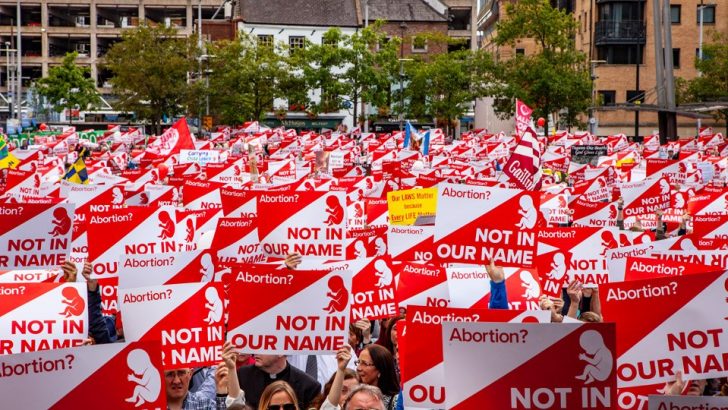The View
There has not been much publicity for the current government consultation on abortion in Northern Ireland. It closes at 11.45pm on December 16. Responses to the consultation should inform the new proposals for the provision of abortion in the North. Readers will know that law was passed in Westminster last July requiring the introduction of abortion. This consultation now follows that legislation.
Those who believe, like me, that abortion is wrong should respond to this consultation. It is the last and only opportunity to challenge what is proposed.
The consultation document is available to those who use the internet – you can get it on line on the Northern Ireland Office website. If you don’t use the internet, the only way to get is to write to the NIO asking for a copy of the document. You can’t phone and request one.
For those who are unable to access a computer, and who suffer from a disability which restricts mobility or eyesight for example, there appears to be no special provision. There is no provision for those who have literacy difficulties. There has been no publicity after the initial announcement. One could be forgiven for thinking that Government is not over eager to receive responses.
Importance
Yet this is a most important consultation.
Despite its importance, however, it is framed in vague language. There is no specificity. It has 15 questions. It does not have the normal provision for answering ‘yes’, ‘no’ or ‘either’ or some alternative response. The person completing the consultation can fill in a box in which they can write anything, however the default position is that one answers ‘yes’ or ‘no’ to this series of questions.
For example, the first question is whether abortion should be available on demand up to either 12 weeks or 14 weeks. This should not be the question. It presumes that one accepts that abortion should be available on demand up to either 12 or 14 weeks. One is then invited to answer ‘yes’ or ‘no’ to that question. The law under which the consultation is being conducted does not require abortion on demand at any stage. There is no opportunity to answer what should be the first question – “do you want abortion on demand?” – simply by saying ‘no’.
Threat
The government asks whether abortion should be available to 21 weeks and six days or 23 weeks and six days if “the continuance of the pregnancy would cause risk of injury to the physical or mental health of the pregnant woman or girl, or any existing children or her family, greater than the risk of terminating pregnancy”. It does not define or qualify that risk, even in the case of a situation in which it suggests that pregnancy might be a threat to the health of family members.
Again, the assumption is that people will choose either effectively 22 weeks or 24 weeks and can understand the implications of the proposed ground for abortion, which is so vague as to be almost incomprehensible.
It does not allow for the fact that there are right-thinking members of society who do not believe that killing unborn children is justified, other than in situations in which the mother cannot survive and treatment to keep her alive necessarily means that the unborn baby will die – these very tragic circumstances in which either the mother dies or she receives treatment and the unintended consequence is that the baby dies are exceptionally rare. Many obstetricians go through their careers without encountering such an extreme situation.
Perhaps most shocking of all is question four which asks whether abortion should be available up to birth “where there is a substantial risk that the foetus would die (in the womb) or shortly after birth or where the foetus would suffer a severe impairment, including a mental or physical disability which is likely to significantly limit the length or quality of the child’s life.”
Again, there is no definition about what constitutes a severe impairment. We know that in England and Wales 90% of babies with Down syndrome are aborted to birth. There are many conditions which might significantly limit the length or quality of a child’s life, but that does not mean the child should be killed in the womb.
***
It has never been said in human rights law that a child has no right to life. Children in the womb who suffer from any disability should be treated, not killed. Their parents should be helped to look after them, for every life is precious, and we can see what happens when society facilitates the abortion of unborn babies – in England and Wales alone over 200,000 babies were aborted last year.
In the space of just over a weekend in July more than 20,000 people in the North signed a letter asking the Prime Minister not to facilitate this legislation”
The government ask also whether any law to protect conscientious objectors – those medical and other practitioners who have an objection in conscience to being involved in abortion – should reflect the practice in the rest of the UK.
The law as it now stands in Britain does not protect medical practitioners from being involved in abortion. It effectively provides only that they do not have to be involved, in theatre, in any surgery to abort a baby.
In all other aspects of the abortion they have no protection. So, a nurse manager would be required to manage, organise and provide general care for a woman who has an abortion. Of course, all medical practitioners must respond when a woman is in a dangerous situation – perhaps bleeding out after an abortion – and that is right. But it cannot be right to make a practitioner participate in any manner in something which is designed to kill a baby.
The basic principle of all medical care has been “first do no harm”. For those who recognise and acknowledge the harm inherent in the deliberate killing of a child in the womb there should be a right not to be involved at any stage.
These are just a few of the questions. In the space of just over a weekend in July more than 20,000 people in the North signed a letter asking the Prime Minister not to facilitate this legislation. Over 20,000 marched up to Stormont to protest against the legislation, saying ‘Not in my name’. Tens of thousands of others attended protests in Custom House Square and other places.
***
Unborn babies now need everyone who cares about them, and wants to protect them from abortion, to respond to this consultation pointing out how flawed and wrong it is. It won’t take long to answer the 15 questions and to prevent these shocking and terrible proposals becoming law. It has to be done by 11.45 pm on December 16.
There are clear signs that the Northern Ireland Assembly is about to go back to business after three years – if it doesn’t do so by January 13 it faces another election. I think they will be back.
The British government should move at the very least to withdraw this flawed consultation document, repeal the new law on abortion and leave the matter to be dealt with by the Northern Ireland Assembly.


 Nuala O’Loan
Nuala O’Loan
